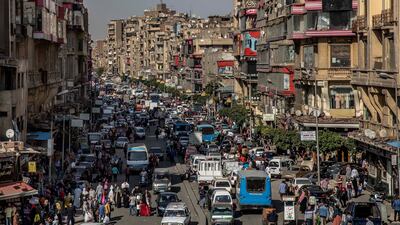Egyptian government ministries have been told by the Prime Minister to slash spending for the next six months in a bid to reduce the outflow of foreign currency and bring down rising inflation.
Egypt’s official gazette reports only the departments of health, interior, foreign affairs and defence are exempt from the cuts. The rest have been directed by Mostafa Madbouly to limit spending to continuing national projects and postpone any that are pending until the next fiscal year.
Additionally, government agencies responsible for securing food and energy will be exempt from the cuts.
Government ministries will require the Finance Ministry’s approval for any foreign currency spending.
The measures also include the indefinite postponement of yet-to-start projects with a dollar component and restrictions on superfluous expenses such as foreign travel by officials, recreational activities, attending conferences and hosting work events.
Additional costs such as office supplies and training for employees will be slashed as the country faces leaner times. Measures include tighter controls on the import of non-essential foreign goods.
Mahmoud Badra, a prominent economist, phoned a popular talk show on Monday night to elaborate on the cutbacks.
He said the government must stay the course and enforce the cuts, after it decided to undertake economic reforms outlined by the IMF. Those reforms were a condition of the IMF extending more loans to Egypt, he said.
The conditions include implementing a more market-determined exchange rate for the Egyptian pound and a reduced role for government in the private sector.
"We are already on this course and there is no turning back," Mr Badra said. "No amount of discussions can be had to change that any more since the government has already committed itself to meeting the IMF's demands."
While speaking at a conference on local development on Monday afternoon, President Abdel Fattah El Sisi addressed the months-long economic crisis which has worsened in recent weeks, with the Egyptian pound reaching a record low exchange rate against the dollar.
As prices have continued to increase for millions of Egyptians, so too has anger towards against Mr El Sisi, who has been repeatedly criticised for his government’s handling of the economy, particularly the funds allocated for vast construction projects.
“The circumstance is very, very difficult,” Mr El Sisi said of the country’s economic woes, which he blamed on the Russia-Ukraine war and the coronavirus pandemic. The president urged citizens to turn a blind eye to criticism of the economy.
“Listen to us, not because we are more truthful than others but because we are more aware than others of the magnitude of the challenge,” he said.
Egypt’s Finance Ministry in June revealed it would allocate about 2.7 trillion Egyptian pounds for the 2022/23 fiscal year. It was not specified what proportion of that the government is intending to cut with the new measures.











